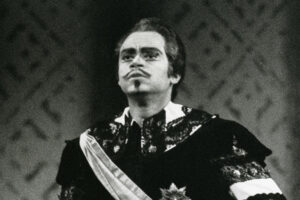

In Mexico, the hybrid folk song style remains traditional at weddings and baptisms; Mexico City’s Garibaldi Plaza still teems with musicians to this day, with many hawking their song catalogues like so many artisanal calaveras. Mariachi bands travel the world, make appearances in Hollywood, and moonlight on Linda Ronstadt albums.
But why stop there? Starting Thursday for a limited run, as part of its Ópera en español series, City Opera premiered America’s self-proclaimed “first mariachi opera” at Jazz at Lincoln Center’s Rose Theater.
The one-act Cruzar la Cara de la Luna (“To Cross the Face of the Moon”) features music and lyrics by the late violinist/composer José (“call-me-Pepe”) Martínez, a book by Texas opera mainstay Leonard Foglia, a 13-piece mariachi orchestra, and a bare-bones plot about diaspora, family, and migration.
Commissioned and first performed by Houston Grand Opera in 2010, the work hasn’t changed much since the start of the decade. Many members from the flagship company reprise their roles in New York City Opera’s current version. NYCO’s revival also retains the Houston original’s minimalist costumes, sets, lighting and direction.
The result is a thematically modest show, about two-thirds sung, albeit one with few innovations beyond the exotic music style itself.
Cruzar presents the familiar tale of a dying immigrant caught between two worlds. Laurentino (Octavio Moreno) is an aging patriarch from Michoacán, Mexico, who moved to America for work, leaving behind his adoring wife Renata (Cecilia Duarte) and first son Rafael, as well as family friends Lupita (Vanessa Alonzo) and Chucho (Miguel De Aranda).
When the story begins, though, Laurentino is on his deathbed in New York, cared for by his second son Mark (Efrain Solis) and granddaughter Diana (Maria Valdes).
In roughly an hour and a half we encounter the ghosts of his past through a series of flashbacks, and follow his offspring in their quest to help him reconcile his two lives. The story is told without much scenery, with only two set pieces—bed and multipurpose platform.
Filling in for the lack of visuals, the show’s orchestra (vividly supplied by the Grammy-winning Mariachi Los Camperos) functions as a kind of Greek chorus, standing at attention onstage throughout the action.
On opening night, the production’s main attraction was, unsurprisingly, the music, which was mostly a pleasure to experience. Despite the genre’s occasional sameness, ballads and stompers were charmingly performed by Duarte, Moreno and Solis, all three of whom brought stirring operatic pathos to their already resonant voices.
Alonzo, who created the role of Lupita in 2010, is apparently the lead vocalist for a Latin-fusion band back in Houston, and her unaffected vocal style endowed a smaller role with winning mariachi authenticity. In contrast but no less affecting was Daniel Montenegro, who brought a more operatic technique to the role of adult Rafael, and stunned with a brilliant tenor.
I wish that the rest of the production were quite so ebullient. For all of his global vision, Foglia (who also directed Dead Man Walking for NYCO in 2002) remains a surprisingly hidebound director with regrettably few imaginative instincts. This was a production of sing-standing to the audience, with spectators asked to do a lot of the legwork to visualize transitions between places and historical periods.
A good measure of dialogue was spoken, too, which meant actors had to, well, act: an easier stipulation for some thespians than for others, apparently. Cruzar’s staging hung them largely out to dry.
I must say Foglia fares not much better as a storyteller. Heavy-handed metaphors—butterflies migrating back to Mexico, comparing how grass grows in Mexico vs. New York, the sensation of collapsed distance induced by a phone call, etc. etc. etc.—dot the libretto’s poetic terrain. “Our hearts don’t forget the South while in the North,” warbles the orchestra chorus. My Northern heart wished it’d remembered to bring a red pen to the proceedings.
Historically, the point most critics raise when considering this mariachi opera has concerned its branding—is it in fact an “opera” or not? I find this question somewhat misguided, as the work is clearly not an opera in the traditional sense.
For me the more interesting question is why a company like NYCO would select this particular black-box-scale production for its season, dress it way down, and then dwarf it further with an auditorium as large as the Rose Theater?
Seats were painfully vacant on opening night, which felt more than a little belittling to the performance itself, especially since the show was intended to expand our understanding of what opera could be.
So-called cultural programming is a terrific pursuit, of course, and one to be applauded. But presenting cultural works also requires more than casual consideration of venue and reception. Were Cruzar presented in a smaller, more intimate, less impersonal space, the audience might have felt closer to the significant sense of identity cleft many migrant workers grapple with.
And for a show such as this, closeness is vital, especially when Mexico already feels so distant, and so far away.
























Comments